Our fellows
DC 01 – Semontee Deb

Semontee Deb holds a Master’s degree in Atmospheric Sciences and a Bachelor’s Degree in Physics, from the University of Calcutta, India. She contributed to a peer-reviewed publication in the Journal of Geophysical Research, which focussed on solar-ionospheric interactions,gaining valuable experience in data analysis, numerical modeling, and scientific writing.
She gained experience in air pollution,aerosol–cloud interactions and dust transport mechanisms over the Indian region as a project associate in the Indian Institute of technology Kanpur.
With a strong foundation in physics and mathematics, she is particularly interested in understanding the dynamics of atmospheric dust and its impact on air quality and climate. As a Marie Skłodowska-Curie PhD researcher within the DUST-DN network at the Cyprus Institute, her work will involve the simulation and analysis of dust transport processes in the Eastern Mediterranean and Middle East region. Her research combines numerical weather prediction models, satellite data, and ground-based observations to enhance the characterization and forecasting of dust events.
DC 02 – Kenneth Marvin Tschorn
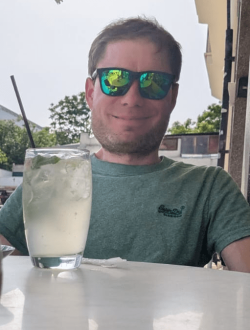
My name is Kenneth Tschorn, I am a PhD candidate at the Cyprus Institute and the Technical University of Darmstadt (Germany). During both my bachelor’s and master’s degree, I studied Geography at the University of Bonn (Germany) with strong focus on the spatiotemporal variability of particulate matter air pollution from cruise traffic in the UNESCO World Heritage Natural Site Geirangerfjord, Western Norway. I completed one ERASMUS+ exchange semester at the University of Bergen (Norway), and another one at the Norwegian University of Science and Technology (NTNU) in Trondheim (Norway). As a research associate within a long-term air quality monitoring program at the aforementioned UNESCO World Heritage Natural Site Geirangerfjord, I gained valuable experiences such as conducting field work in a particularly cold climate as well as teaching both undergraduate and graduate students on climatology, air pollution and other related topics.
My transition from Norway to Cyprus has given me new potential to grow within one of the leading research Institutes in the eastern Mediterranean area. As part of DUST-DN, I am focusing on the microphysical properties of atmospheric dust. This includes the development of methodologies to sample dust particles and acquire three-dimensional images by applying advanced Transmission Electron Microscopy (TEM). Furthermore, I am also interested in dust particle orientation, which may be inferred by analyzing datasets of a dual-FOV backscatter sonde.
Overall, my aim is not only to advance my own doctorate project, but also to foster collaboration and contribute to the Dust-DN network as a whole. In any case, my philosophy remains clear: passion for science, passion for a better planet!
DC 03 – Zuhir Bona
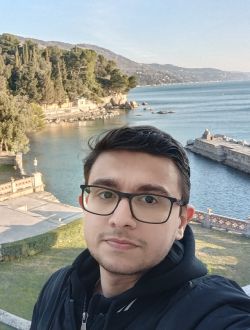
Zuhir Bona is a PhD student and Graduate Research Fellow at the CARE-C Centre of Excellence, The Cyprus Institute, working on the Marie Skłodowska-Curie funded DUST-DN project. He holds a Master’s degree in Theoretical Physics (2025) and a Bachelor’s degree in Physics (2021), both from the Faculty of Science, Mansoura University, Egypt.
His research investigates the global distribution of mineral dust and its interactions with clouds. He employs remote sensing techniques to enhance our understanding of mineral dust’s role in the Earth system.
DC 04 – Ajatshatru Balaji
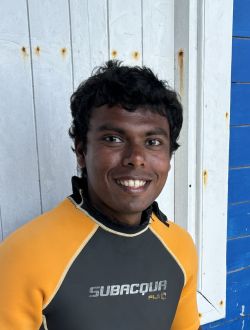
I, Ajat, am investigating the aerodynamics of gravitational settling of non-spherical mineral dust in the atmosphere. This research aims to enhance our understanding and modelling of planetary dust transport. As an MSCA Doctoral Fellow at the University of Reading, I conduct scaled-up particle-settling experiments in a fluid tank, using 3D-printed dust analogues designed from real mineral dust samples. This allows me to characterise key properties of mineral dust in free fall – such as orientation, trajectory, and velocity – across a range of naturally occurring particle geometries.
This work follows on my experience with controlled-environment experiments and measurements in oceanography and marine aerosols, gained during my graduate research degree at Dalhousie University.
DC 05 – Sai Amritha Kuttippurath
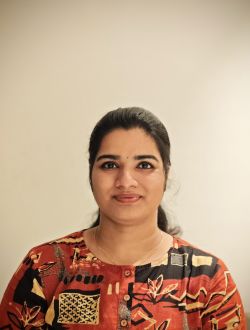
I’m Sai Amritha Kuttippurath, a Marie Curie Doctoral Researcher in the Dust-DN network at the University of Reading. I graduated with First Rank in Physical Oceanography from Kerala University of Fisheries and Ocean Studies, India, where I discovered my passion for atmospheric and climate sciences, particularly air quality and its societal impacts.
For my MSc dissertation, I worked at IITM Pune on NO₂ pollution in collaboration with IIT Kharagpur, which was published in Sustainable Cities and Society. I also studied SO₂ pollution in collaboration with IITM Pune and IIT Kharagpur, published in Global Transitions. Additionally, this collaboration resulted in another paper studying NO₂ changes during the COVID-19 period, which is currently under review in Journal of Hazardous Materials Letters. Before joining Reading, I worked as a Project Associate at NIO Goa on ocean circulation biases (paper under revision in Theoretical and Applied Climatology) and as a Junior Research Fellow at IIT Bhubaneswar studying urban heat islands and urban pollution. I also trained at IISc Bangalore under their National Training Program on Aerosol and Climate.
My PhD focuses on “The impact of mineral dust on aircraft engines in the Middle East,” aiming to understand how dust emissions affect aviation safety and operations. Through this work, I plan to contribute to improving dust prediction systems and developing strategies to mitigate dust-related risks for the aviation sector. I am excited to collaborate within Dust-DN and contribute impactful research that bridges atmospheric science with real-world engineering solutions.
DC 06 – Afrooz Jouzdani
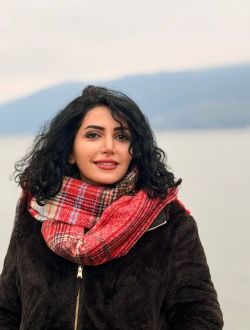
I am Afrooz Jouzdani, a Marie Skłodowska-Curie Doctoral Researcher (DC6) within the DUST-DN network, based at the University of Évora, Portugal. I hold a Master’s degree in Physics with a specialisation in Atmospheric Remote Sensing from the Institute for Advanced Studies in Basic Sciences (IASBS), Iran.
My academic background focuses on atmospheric dust and its interaction with radiation. During my master’s research, I investigated the impact of dust on surface temperature and atmospheric radiative forcing across several stations in Southwest Asia, using aerosol optical properties from AERONET together with meteorological datasets.
My PhD research focuses on modelling and assessing the impact of atmospheric dust on solar resources for energy applications. In particular, I study how intense dust events affect Direct Normal Irradiance (DNI) and Circumsolar Normal Irradiance (CSNI) by combining radiative transfer modelling with ground-based and remote-sensing aerosol observations. A key objective of my work is to develop advanced parameterisations for DNI and CSNI under extreme dust conditions, with direct relevance for concentrating solar technologies.
In parallel, I contribute to the development of a prototype pyrheliometer with a variable field of view (FOV), aiming to improve the experimental quantification of circumsolar radiation and its integration into solar resource assessments.
My doctoral training includes planned secondments at the Physikalisch-Meteorologisches Observatorium Davos / World Radiation Centre (PMOD/WRC), the Plataforma Solar de Almería (PSA), and Ernst & Young in Cyprus, strengthening the link between atmospheric science, solar energy engineering, and applied energy solutions.
DC 07 – Ginés Garnés Morales
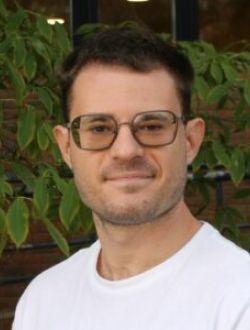
I am Ginés Garnés Morales, from Spain. I hold a Bachelor’s degree in Physics from the University of Murcia, where I developed a strong interest in Earth Physics, particularly climatology and meteorology, completing my final project on the role of aerosols in the atmospheric system. During an Erasmus+ traineeship at the Helmholtz-Zentrum Hereon (Geesthacht, Germany), I gained first-hand research experience, which proved highly inspiring. I then pursued a Master’s degree in Geophysics and Meteorology at the University of Granada, gaining a broad knowledge in this field, specially in remote sensing techniques for the study of atmospheric aerosols. After graduation, I worked for nearly two years as a postgraduate researcher in the Regional Atmospheric Modeling Group at the University of Murcia, contributing to projects on wildfires and compound events of temperature and air pollution.
Now, it is time to take a step forward. As a doctoral candidate within Dust-DN, my PhD project aims to analyse the dust radiative balance over the Sahara Desert, with particular emphasis on the role of super-coarse and giant particles in the direct radiative effects of atmospheric dust. This PhD is a joint degree between the University of Reading (year 1) and the University of Évora (years 2–3).
DC 08 – Noor Ul Ain
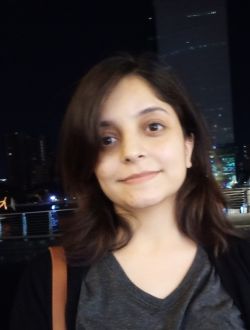
I’m Noor Ul Ain, PhD fellow within DUST-DN Doctoral Network at the University of Évora, Portugal. I hold a master’s degree in Applied Biological Sciences: Environmental Health from Chulabhorn Graduate Institute, Bangkok, Thailand, where I developed an interest in studying the environmental chemicals affecting human health and the environment.
I recently worked as a Research Associate at the Aga Khan University, Pakistan where I created learning material for understanding Environment and Climate Change aimed at promoting sustainable practices and long-term behavioral change among vulnerable communities.
For my master’s thesis, I studied the effects of ultrafine particles on DNA methylation and DNA damage in umbilical cord-derived mesenchymal stem cells. This work highlighted the risks of early-life exposure to air pollutants and deepened my motivation to pursue research that informs policies and mitigates the health impacts of air pollution. I also published a review article explaining the cardiovascular impacts of particulate matter.
My PhD research at University of Evora as part of DUST-DN, is related to the impact of atmospheric dust on human health. My work will involve collecting dust samples and exposing lung epithelial cells in an Air–Liquid Interface system, which will closely mimic real lung exposure. In exposed cells, I will investigate molecular changes linked to inflammation-related diseases. Through this project, I’m excited to apply my skills, gain new expertise, and collaborate with researchers across the DUST-DN network to advance my knowledge about the impacts of atmospheric dust.
DC 09 – Amirhossein Kholghi
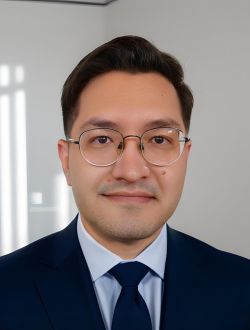
DC 10 – Johanne Ayeley Ekue

Johanne Ayeley Ekue is a Marie Skłodowska-Curie Doctoral Researcher pursuing a PhD in Atmospheric Physics at the Aristotle University of Thessaloniki, hosted by the National Observatory of Athens. Her project, titled “New scattering database for desert dust, with realistic size, shape and refractive index measured in-situ (MSCA DUST-DN),” focuses on improving the representation of dust optical properties in atmospheric and climate models . She holds a Master’s degree in Space Geophysics from the National Institute for Space Research (INPE), Brazil, and a Bachelor of Science in Physics from the University of Ghana.
DC 11 – Fernando Pacheco Bueno
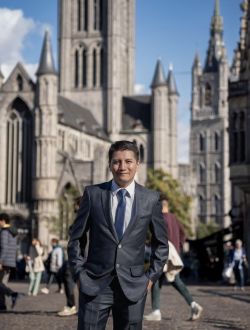
My name is Fernando Pacheco Bueno. I am an Ecuadorian environmental engineer with a master’s degree in Environmental Science and Technology, along with postgraduate studies in weather and climate modeling; both from Ghent University in Belgium. My research focuses on modeling super-coarse dust particles in the atmosphere and understanding their role in the Earth’s climate system. By improving how climate models represent the size, transport, and distribution of these larger particles, we aim to achieve more accurate estimates of their radiative forcing.
DC 12 – Francesco Moncada
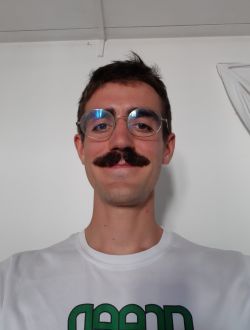
During my bachelor’s degree, I studied physics at the University of Milan, my home town. During this time, I followed with interest climate-related courses, which led me to pursue a master’s degree in climate physics at Utrecht University in the Netherlands. Drawn by my fascination with mountains and pristine nature, I conducted my master’s thesis at the Institut des Géosciences de l’Environnement (IGE) in Grenoble, where I studied Antarctic ice shelves using machine learning techniques.
Building on my experience in climate modeling and data analysis, I am now part of the Dust-DN project, where my research will focuses on modeling the spatial representation of resolved mineralogy. By integrating newly released satellite data, the project aims to improve our understanding of airborne dust effects on climate, particularly over Northern Africa, the Middle East, and Europe. The modeled predictions will be evaluated against in-situ, remote, and satellite observations.
DC 13 – Marcos Eduardo Pérez Morán
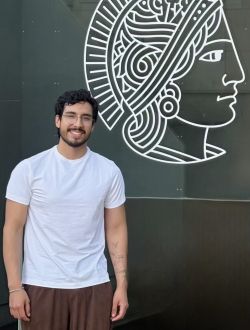
My name is Marcos Pérez Morán, a Peruvian environmental engineer and MSCA doctoral researcher in the DUST-DN network. I completed my master’s degree in environmental engineering at the University of Aveiro (Portugal), where I also worked as a research fellow at the Centre for Environmental and Marine Studies. My master’s dissertation was part of the PRUNING project, funded by the Portuguese Foundation for Science and Technology, and focused on modelling the air quality impacts of open burning agricultural residue in Valencia, Spain.
Throughout my journey, I have built a solid foundation in air quality and climate science across academic, technical, and field-based contexts. Earning a Pacific Alliance fellowship for an academic exchange in Chile, pursuing specialized training in environmental acoustics, and contributing to environmental impact assessments for large-scale infrastructure and mining projects in Latin America.
Currently, my research focuses on the characterization of dust events in the Mediterranean and Western Africa through single-particle analysis using advanced electron microscopy. I investigate the variability in particle composition, size, and morphology, and trace the origin of major dust outbreaks by integrating atmospheric modelling tools within the Institute of Applied Geosciences at TU Darmstadt. This approach aims to improve our understanding of how dust events differ in their physical properties and source regions.
DC 14 – Babak Ahmadi
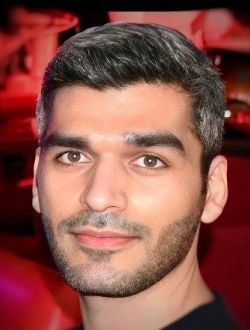
It all started with a seminar that had a significant impact on my research direction. After earning my master’s degree in mechanical engineering from Iran, I attended an eye-opening seminar on “Numerical simulations of particle transport in environmental and biological flows.” This sparked my curiosity about the applied domain of particulate flows, and it quickly became a primary research focus of mine. Therefore, I conducted collaborative research on the “Numerical simulations of an axial vortex particle separator to remove dust particles from dilute particle-laden flows”, and our paper was published in the Advanced Powder Technology Journal.
I am currently an MSCA Early Stage Researcher in the Mineral Dust group at Karlsruhe Institute of Technology (KIT). My PhD project, which is part of the Dust Doctoral Network (Dust-DN), will focus on size-dependent turbulent dust transport using high-resolution simulations. With an engineering background and prior experience with particulate flows, I will use Large Eddy Simulations (LES) within the ICON-ART model to better understand the impact of atmospheric turbulent structures on vertical dust transport. This research will result in more accurate weather and climate modeling.
DC 15 – Miguel Huerta Gómez
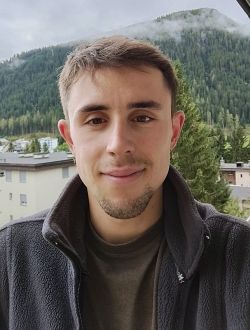
My name is Miguel Huerta Gómez, and I was born in Segovia, Spain. I graduated in Physics in 2024 from the University of Valladolid (UVa). During my final year, I joined the Group of Atmospheric Optics (GOA-UVa) as a trainee technician. After earning my degree, I continued working at GOA-UVa as a technician through a research scholarship.
This position allowed me to gain valuable experience in solar photometry, particularly in operating and maintaining instruments, mainly spectroradiometers, and in analysing aerosol-related data. While working as a technician, I also completed a Master’s degree in Physics at UVa, specializing in Atmospheric Physics and Climate. During this program, I studied the fundamentals of atmospheric physics, such as dynamics, thermodynamics, and radiative transfer, but focused mainly on aerosol research, in line with GOA’s expertise.
Since September 2025, I have been a PhD student within the Marie Skłodowska-Curie funded Dust Doctoral Network (Dust-DN). My research focuses on obtaining and analysing solar irradiance measurements from spectroradiometers deployed worldwide, in order to derive aerosol microphysical properties from different dust sources.
I am carrying out my doctoral research at the Physikalisch-Meteorologisches Observatorium Davos / World Radiation Center (PMOD/WRC) in Davos, Switzerland, a WMO-designated institute that hosts the world reference instruments for solar radiation and aerosol optical depth (AOD) measurements.
DC 16 – Eleni Kolintziki
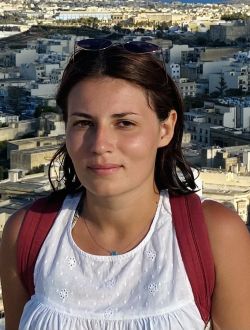
Eleni Kolintziki majored in Agriculture at the Aristotle University of Thessaloniki, completing her thesis on land degradation and how it affects food security in Greece and Tunisia, employing the cloud-based remote sensing tool ‘’trends.earth’’ and calculating the 15.3.1 SDG indicator. She earned a Master’s in Environmental Sciences from Trinity College Dublin, where she broadened her knowledge on pressing environmental issues, while becoming familiar with environmental policies and more advanced geospatial analysis. She has an interdisciplinary background and experience in research, bringing a diverse skill set to her work. As a PhD researcher within the Marie Curie-funded DUST-DN network at the Cyprus Institute, she will focus on quantifying and characterizing dust microphysical properties in the Mediterranean and Middle East. Her research will integrate in situ and remote sensing tools for monitoring dust and identifying their sources.
DC 17 – Evelin Francis
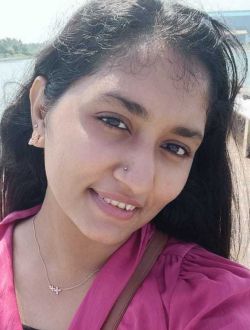
I am Evelin Francis, a Marie Curie Doctoral Researcher with the Dust-DN Project at the Aristotle University of Thessaloniki and the National Observatory of Athens.
My doctoral project, “Ice Nucleating Dust Particle Concentration Profiling and Effects on Ice Crystal Formation,” aims to investigate the role of ice-nucleating dust particles (INPs) in cloud glaciation processes. I assimilate ground-based lidar observations from the Polly/ACTRIS network into the WRF-L model to study how dust properties influence ice crystal formation and cloud microphysics under different model configurations.
I hold a Master’s degree in Meteorology from the Cochin University of Science and Technology (CUSAT), India. Before joining Dust-DN, I worked as a Research Scientist at the Vikram Sarabhai Space Centre (VSSC), Indian Space Research Organization (ISRO), where I was involved in the operation and analysis of a C-band polarimetric Doppler weather radar.